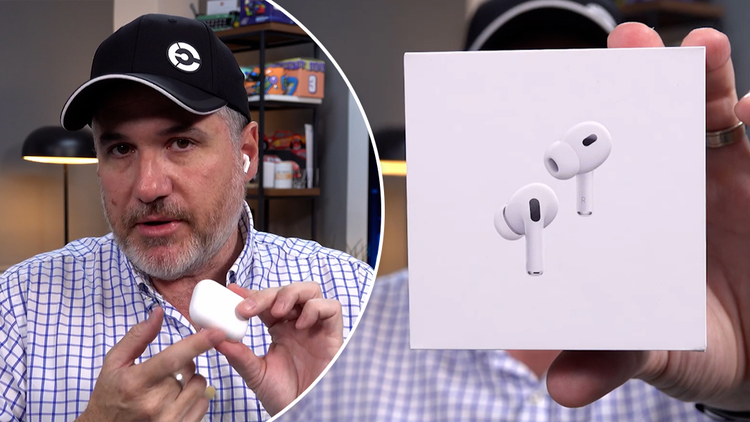
The naming of this product is itself quite confusing, because these are in fact the third generation of AirPods Pro — the key feature difference is "just" the charging case.
There are hardware tweaks on the inside but perhaps not enough for Apple to give it a next-generation number.
AirPods Pro 2nd generation 2023 USB-C charging

To ensure you're buying these second generation AirPods Pro you'll need to look for the USB-C in the product title, otherwise you're getting the original 2nd generation with the now defunct Lightning connector.
Confused? Sorry about that — Blame the crack team of marketing and product gurus at Apple.
These are the first products of the full USB-C generation for Apple.
Although iPads and MacBook have charged with USB-C for years, the phones and other accessories' switch to this universally accepted (and European Union-enforced) connector means you can share a charging cable with any mate with any smartphone.
That alone isn't a reason to buy the new AirPods Pro. That reason lies firmly in the software, which is also available to users of the existing AirPods Pro 2nd generation.
AirPods Pro 2nd generation 2023 software

From a hardware perspective, the USB-C AirPods Pro are now IP54-rated for water, dust and sweat resistance. This makes them more durable than other AirPods — great for those that are active and in the outdoors.
They also feature lossless and ultra-low-latency audio. But don't get excited audiophiles, you can't take advantage of that on your computer or iPhone; this "groundbreaking wireless audio protocol" will work with the new Apple Vision Pro headset when it comes out next year.
From a usability perspective, AirPods Pro have never been more amazing. Two new features are available on these headphones when your iPhone updates to iOS 17 (Which will be available to the public on Tuesday).
AirPods Pro 2nd generation 2023 Adaptive Audio and Conversation Awareness

Adaptive Audio is a new listening mode, which sits alongside full noise cancellation and the Transparency mode, which allows you to hear what's happening around you while you're wearing AirPods.
Basically, Adaptive Audio automatically adjusts the level of noise cancellation based on the environment you're in. So when you get onto the plane it might be mid-range, but when those engines fire up, it will implement full noise cancellation.
The same in busy work environments, allowing you to focus more.
How much is your old iPhone worth?
The downside to that is potentially blocking out conversations. Well, that's where Conversation Awareness comes in.
When enabled, your AirPods will adjust the music volume down when you start talking, allowing you to easily get into a conversation without touching your phone or AirPods.
When you're in the middle of a conversation it will stay in this mode, as long as you engage in the chat now and then.
In my testing, the volume would decrease (in a measured way, not instantaneously) after about two to three seconds of me talking. If I then just listened, it would increase again after 10 seconds of me not talking.

Critically, I didn't have any "false positives" where the headphones reduced volume when someone else around me spoke; it was only when I spoke that the feature kicked in.
Really great stuff, but not unique as I've seen other brands like Sony do similar things.
The big caveat is don't sing along to any music with Conversation Awareness on; your music will fade down fast.
These software features make it more possible than ever to just keep your AirPods in all the time, though, I'm still not sure I'm ready for that personally.





